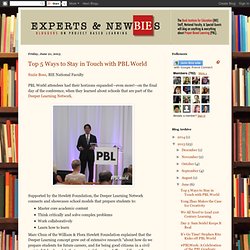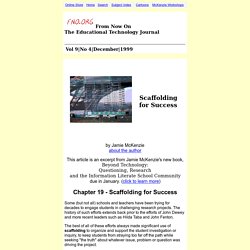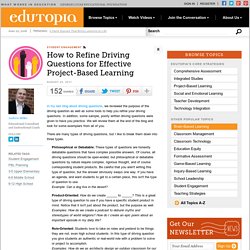

PBL Blogspot. Suzie Boss, BIE National Faculty PBL World got off to a fast start this morning with a high-energy keynote from Stephen Ritz, passionate educator and founder of Green Bronx Machine.

Since 2006, he has been transforming classrooms, lives, and neighborhoods in the Bronx—and beyond—by using Project Based Learning to introduce students to urban farming. By turning classroom walls into vertical farms, he sets the stage for real-world PBL that teaches students to find and grow opportunities everywhere. Tweets were flying this morning as PBL World attendees shared Ritz’s inspirational, can-do message. Read the highlights on Storify. After the keynote, Ritz took time to offer a few more insights about how to make the most of PBL. Tell us more about how growing vegetables grows citizens and communities. You start by finding a niche where kids are interested. What does success look like? Success looks like so many things. How about academic success? It’s so easy for me to integrate academics. Problem-based Learning in Biology with 20 Case Examples. The Question is the Answer. Scaffolding for Success. By Jamie McKenzie about the author This article is an excerpt from Jamie McKenzie's new book, Beyond Technology: Questioning, Research and the Information Literate School Community due in January.

(click to learn more) Chapter 19 - Scaffolding for Success Some (but not all) schools and teachers have been trying for decades to engage students in challenging research projects. The history of such efforts extends back prior to the efforts of John Dewey and more recent leaders such as Hilda Taba and John Fenton. The best of all of these efforts always made significant use of scaffolding to organize and support the student investigation or inquiry, to keep students from straying too far off the path while seeking "the truth" about whatever issue, problem or question was driving the project.
The least successful efforts assumed too much about student skills, organizational abilities and commitment. Matters of Definition What do we mean by scaffolding in the context of student research in school? Teach21 Project Based Learning. CASES Online: Creating Active Student Engagement in the Sciences. How to Refine Driving Questions for Effective Project-Based Learning. In my last blog about driving questions, we reviewed the purpose of the driving question as well as some tools to help you refine your driving questions.

In addition, some sample, poorly written driving questions were given to have you practice. We will review them at the end of the blog and look for some exemplars from all of you. There are many types of driving questions, but I like to break them down into three types. Philosophical or Debatable: These types of questions are honestly debatable questions that have complex possible answers. Of course, all driving questions should be open-ended, but philosophical or debatable questions by nature require complex, rigorous thought, and of course corresponding student products. Product-Oriented: How do we create ______ to ______? Role-Oriented: Students love to take on roles and pretend to be things they are not, even high school students.
We spend time crafting and refining driving questions for the student. What is epic poetry? PBL toolkit videos.